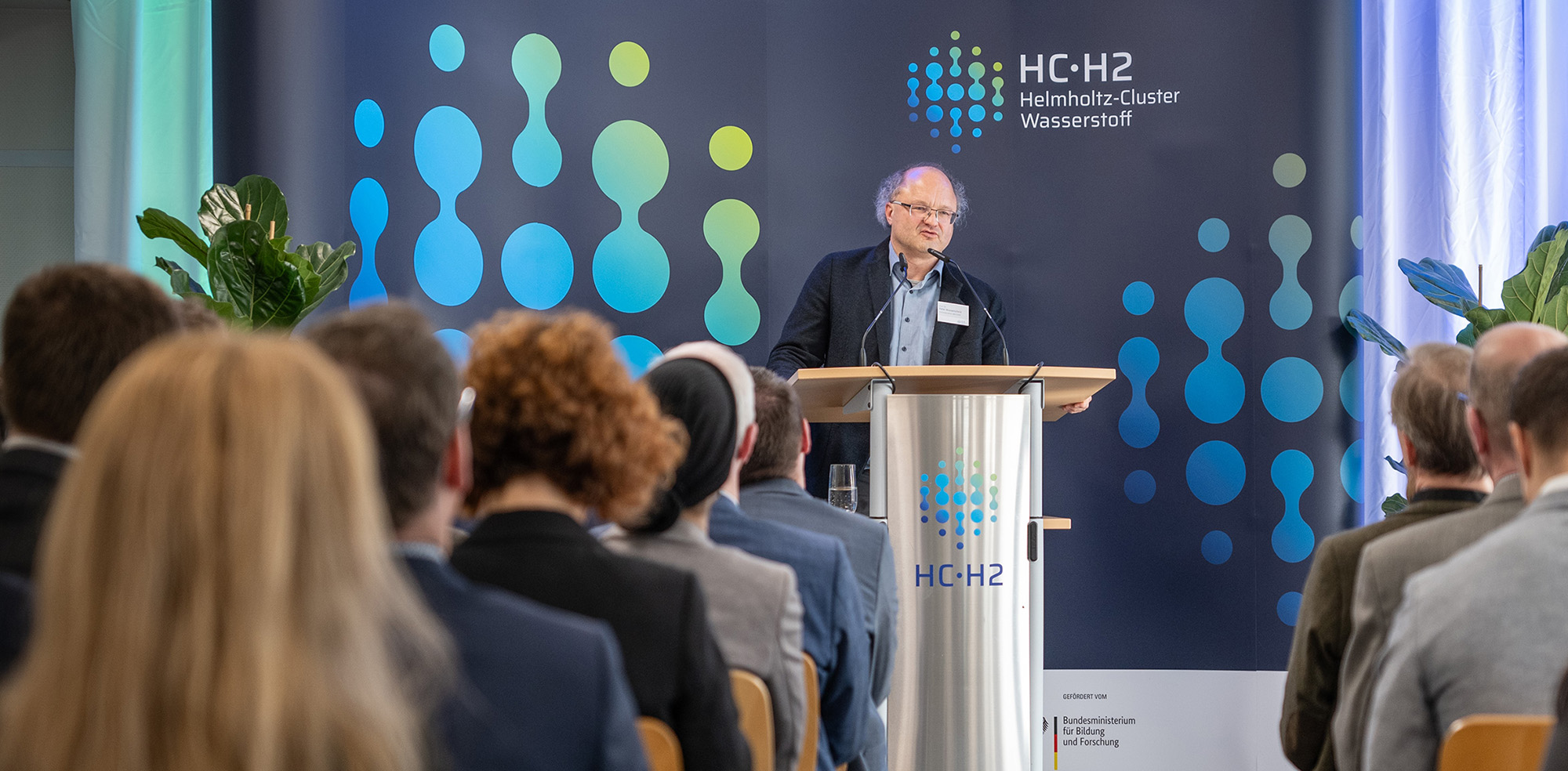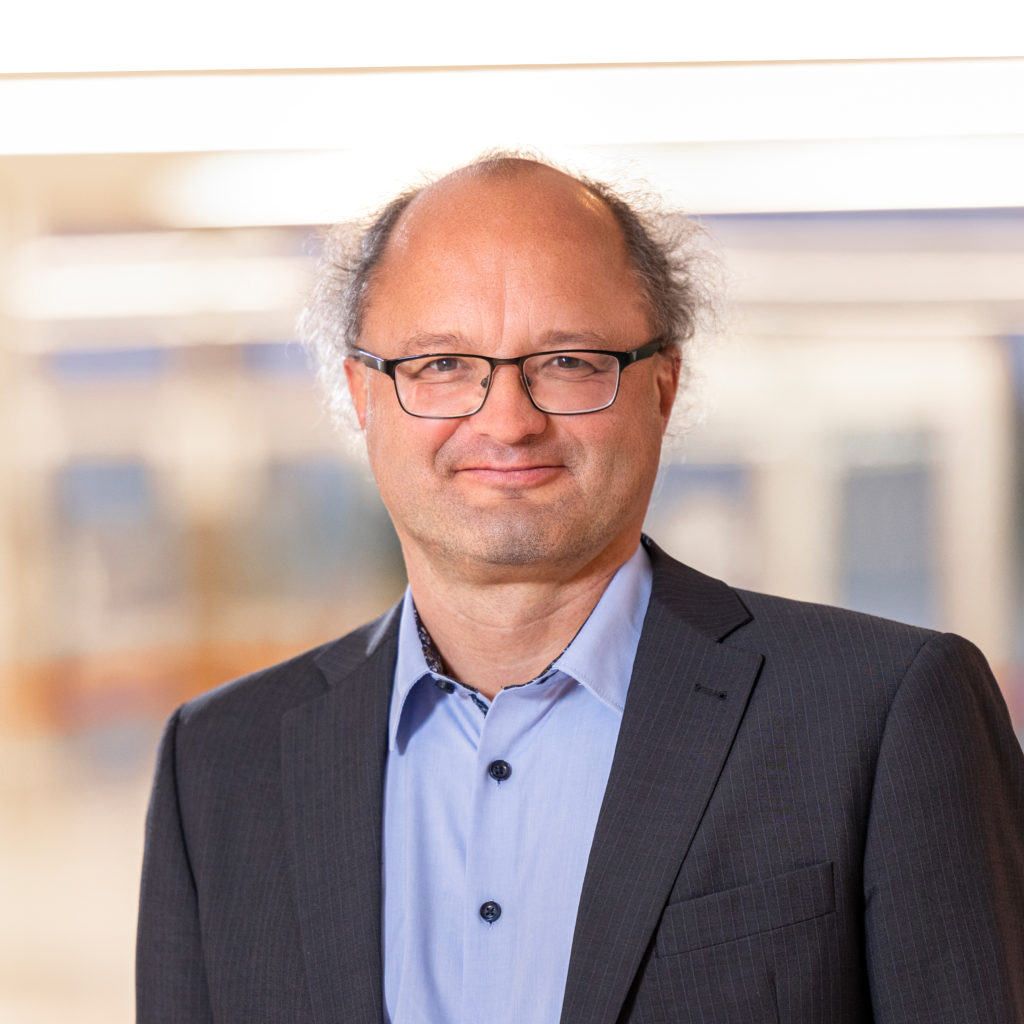Prof. Peter Wasserscheid takes over institute division
Prof. Peter Wasserscheid is the founding director of the Institute for Sustainable Hydrogen Economy (INW). Within the INW, he is now switching from project development back to research on reaction technologies for chemical hydrogen storage. Photo: Forschungszentrum Jülich
The founding phase of the Institute for Sustainable Hydrogen Economy (INW) at Forschungszentrum Jülich has been completed. Prof. Peter Wasserscheid took up the role of Director of the Reaction Engineering for Chemical Hydrogen Storage (INW-3) department in May. This means that the four scientific departments of the INW are now headed by renowned researchers.
‘The INW has left the runway behind, successfully completed its climb and is now setting its sights on its important goals,’ says Prof. Peter Jansens, who is responsible for the energy sector on the Research Centre’s Board of Directors. “We are very pleased that we were able to recruit Peter Wasserscheid, the founding director of the INW, for this very important research area. INW-3 links surface and catalyst research with process and plant engineering at the Institute for Sustainable Hydrogen Economy.”
There from the start
Peter Wasserscheid has been with INW since the very beginning. With him as founding director and head of the Demonstration Projects Department (INW-D), the institute was launched at the end of 2021. Taking over as head of INW-3 now means a return to the focus of his scientific work: designing high-performance reactors for chemical hydrogen storage.
“This task is more exciting than ever. When hydrogen is bound to carrier molecules, heat is released and volume is reduced. When hydrogen is released, the opposite happens. To make hydrogen storage high-performance, cost-effective and efficient, the conversion equipment must be optimally designed. It is the heart of chemical hydrogen storage. The aim, for example, is to release as much hydrogen as possible from a reactor the size of a shoebox as quickly as possible. That’s what really excites me.”
Focus on strong collaboration within the institute
Peter Wasserscheid is particularly looking forward to the scientific collaboration with the other departments at INW: “With Prof. Hans-Georg Steinrück at INW-1, Prof. Regina Palkovits at INW-2 and Prof. Andreas Peschel at INW-4, we now have a great scientific management team at INW. Now we are joining forces to achieve the ambitious scientific and technological goals of our institute. We want to implement the best findings and solutions in order to make our contribution to structural change in the Rhineland mining region.”
Peter Wasserscheid intends to remain closely involved with the topic of technology demonstration, for which he was previously responsible as head of INW-D. “We are realigning INW-D and placing the future focus there on the development of business models and application scenarios for innovative hydrogen technologies in the Rhineland mining area. The technological concepts come from all scientific areas of INW and from other areas of Forschungszentrum Jülich. Of course, we also expect to continue receiving many highly interesting proposals for demonstrators from companies, municipalities, and academic institutions in the Rhineland region.”
About
Peter Wasserscheid (born 1970) has been Professor of Chemical Reaction Engineering at Friedrich-Alexander-Universität Erlangen-Nürnberg (FAU) since 2003 and Director at Forschungszentrum Jülich since 2013. There, he works at the Helmholtz Institute Erlangen-Nürnberg and, since 2021, at the Institute for Sustainable Hydrogen Economy (INW). He helped establish both institutions as their founding director. In 2025, he will move within the INW to take over as head of the Reaction Engineering for Chemical Hydrogen Storage division (INW-3).
After studying chemistry at RWTH Aachen University, he obtained his doctorate in 1998 and then worked for six months as an industrial postdoctoral researcher at BP Chemicals in the United Kingdom. He subsequently habilitated at RWTH Aachen University in the field of technical chemistry. His research focuses on the development of processes for emission-free energy supply in the future and more sustainable production of chemicals.
His group is one of the world’s leading teams in chemical hydrogen storage using LOHC (liquid organic hydrogen carrier) systems. His scientific work includes catalyst and reactor development, system design, demonstration plants and technology transfer.
Wasserscheid has received numerous awards for his research, including the Leibniz Prize of the German Research Foundation (2006), two Advanced Grants from the European Research Council (2010, 2018) and twice the Innovation Award of German Business in the ‘Start-up Company’ category (2003, 2016). He has contributed to over 550 scientific publications and is co-inventor of more than 120 patent families.



